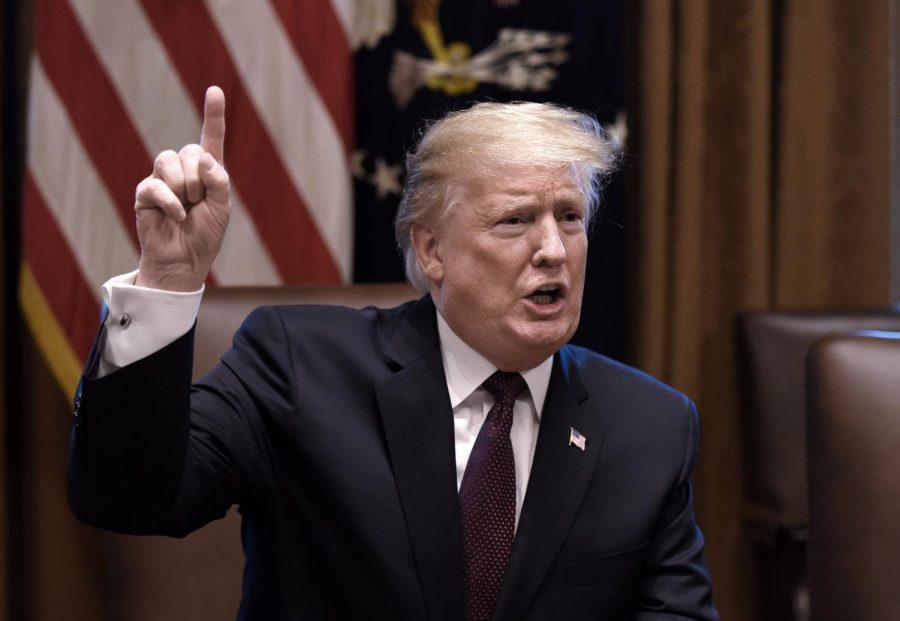Impeachment would be unwise
Photo courtesy of Tribune News Service
President Donald Trump talks with reporters about House Speaker Nancy Pelosi’s letter during a meeting with conservative leaders in the Cabinet Room of the White House on Jan. 23 in Washington, D.C. Columnist Cole writes that the impeachment of the president would only lead to further issues for both Democrats and Republicans.
Jan 29, 2019
The drumbeat for impeachment is back. Notwithstanding, House Speaker Nancy Pelosi’s pledge before the midterms that she would only consider impeachment if it were “bipartisan” and buoyed by “overwhelming” evidence from the special counsel’s investigation, the commentariat and segments of her caucus have urged the cause forward with renewed enthusiasm (and occasional crassness).
Democratic control of the House ensures if she were to be persuaded to allow articles of impeachment to reach the floor, they would be adopted. President Donald Trump has responded with incredulity, wondering how a president who’s “done a great job” could be impeached.
The morass that constitutes our public discourse today has made the impeachment debate all but unintelligible. Amid the bedlam, there are three distinct questions that should be considered separately: What constitutes an impeachable offense? Has the president committed such an offense? And should the House impeach the president?
Any discussion of the first question must rely on the Constitution, which grants to the House of Representatives “the sole Power of Impeachment” and to the Senate “the sole Power to try all Impeachments.” The process of impeachment and removal are only provided for when an official has committed “Treason, Bribery, or other high Crimes and Misdemeanors.”
Although the phrase “high Crimes and Misdemeanors” is bandied about today, it is a term of art that takes on a specific meaning through its historical (and exclusive) usage in impeachment proceedings.
Get The Daily Illini in your inbox!
Chief Justice John Marshall put it succinctly: “It is a technical term. It is used in a very old statute of that country whose language is our language, and whose laws form the substratum of our laws. It is scarcely conceivable that the term was not employed by the framers of our constitution in the sense which had been affixed to it by those from whom we borrowed it.”
To understand what it means, it is necessary to see what it meant to those “from whom we borrowed it.” In England, officials were impeached for a wide range of offenses, including treason and embezzling funds, but also for wrongdoing like “frequent and notorious excesses and debaucheries” that brought “the highest scandal on the public justice of the kingdom.” While the first two are crimes, the latter is not.
The most important thing to note from the traditional requirements for impeachment is “high Crimes and Misdemeanors” can be, but are not limited to, violations of the criminal law. Speaker Pelosi parsed this distinction properly when she said, “What Mueller might not think is indictable could be impeachable.”
In fact, history suggests there are a multitude of offenses the framers would have considered impeachable that did not violate the letter of the law. Edmund Burke captured the prevailing opinion, when, during the famous impeachment trial of Warren Hastings, he declared that impeachments are tried “not upon the niceties of a narrow jurisprudence, but upon the enlarged and solid principles of state morality.”
The question should then turn to whether the president has committed an impeachable offense. It seems indisputable that under the “enlarged and solid” moral standards of former ages, there may be a case. The Minnesota legislature’s impeachment of a judge in 1881 for “frequenting bawdy houses and consorting with harlots” seems particularly relevant.
However, former President Bill Clinton’s impeachment proceedings should caution against seeing this history as instructive, in two ways.
First, Clinton’s personal indiscretions took place while he was in office, while allegations against Trump stem from before he was elected. Voters knew about his perceived moral failings and elected him anyway. Second, the articles of impeachment against President Clinton referred only to his possible obstruction of justice and perjury relating to his affair with Monica Lewinsky, not the affair itself.
Congress abrogated its responsibility to ensure our leaders are moral paragons with President Clinton. That bridge has been crossed — if we have a vulgar and immoral president, we have no one to blame but our ourselves and our vulgar age.
With regard to whether the president has broken the criminal law, clear and convincing evidence has not yet emerged. While that could change when the special counsel’s report is finally released, the evidence to date does not show he has done any worse than commit a campaign finance violation, let alone collude with the Russians.
Given the answers to these questions, it would be exceedingly unwise for the House to push forward with impeachment, for both parties and the country. Impeachment proceedings would suck all of the oxygen out of Washington and make it impossible for either party to pursue their agendas.
Even if the House were to file articles of impeachment, the Senate must secure a two-thirds vote to convict, an impossibility with a 53-47 Republican majority. Further, the Senate may not even agree to conduct the trial, which would make the whole exercise simply a waste of time.
A failed impeachment would infuriate partisans on both sides while accomplishing nothing. The last thing America needs, after a month into a government shutdown, is a new injection of partisan rancor.
Cole is a junior in LAS.






